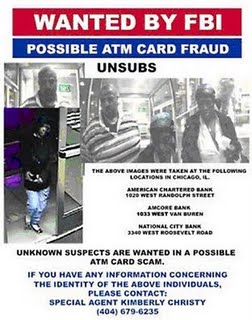November 26, 2009
Breaches not as disclosed as much as we had hoped
One of the brief positive spots in the last decade was the California bill to make breaches of data disclosed to effected customers. It took a while, but in 2005 the flood gates opened. Now reports the FBI:
"Of the thousands of cases that we've investigated, the public knows about a handful," said Shawn Henry, assistant director for the Federal Bureau of Investigation's Cyber Division. "There are million-dollar cases that nobody knows about."
That seems to point at a super-iceberg. To some extent this is expected, because companies will search out new methods to bypass the intent of the disclosure laws. And also there is the underlying economics. As has been pointed out by many (or perhaps not many but at least me) the reputation damage probably dwarfs the actual or measurable direct losses to the company and its customers.
Companies that are victims of cybercrime are reluctant to come forward out of fear the publicity will hurt their reputations, scare away customers and hurt profits. Sometimes they don't report the crimes to the FBI at all. In other cases they wait so long that it is tough to track down evidence.
So, avoidance of disclosure is the strategy for all properly managed companies, because they are required to manage the assets of their shareholders to the best interests of the shareholders. If you want a more dedicated treatment leading to this conclusion, have a look at "the market for silver bullets" paper.
 Meanwhile, the FBI reports that the big companies have improved their security somewhat, so the attackers direct at smaller companies. And:
Meanwhile, the FBI reports that the big companies have improved their security somewhat, so the attackers direct at smaller companies. And:
They also target corporate executives and other wealthy public figures who it is relatively easy to pursue using public records. The FBI pursues such cases, though they are rarely made public.
Huh. And this outstanding coordinated attack:
A similar approach was used in a scheme that defrauded the Royal Bank of Scotland's (RBS.L: Quote, Profile, Research, Stock Buzz) RBS WorldPay of more than $9 million. A group, which included people from Estonia, Russia and Moldova, has been indicted for compromising the data encryption used by RBS WorldPay, one of the leading payment processing businesses globally.The ring was accused of hacking data for payroll debit cards, which enable employees to withdraw their salaries from automated teller machines. More than $9 million was withdrawn in less than 12 hours from more than 2,100 ATMs around the world, the Justice Department has said.
2,100 ATMs! worldwide! That leaves that USA gang looking somewhat kindergarten, with only 50 ATMs cities. No doubt about it, we're now talking serious networked crime, and I'm not referring to the Internet but the network of collaborating, economic agents.
Compromising the data encryption, even. Anyone know the specs? These are important numbers. Did I miss this story, or does it prove the FBI's point?
Posted by iang at November 26, 2009 01:23 PM | TrackBack